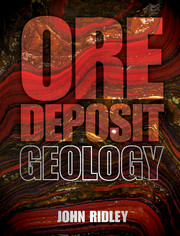Book contents
- Frontmatter
- Contents
- List of boxes
- Preface
- Acknowledgements
- 1 What is an ore deposit?
- 2 Magmatic ore deposits
- 3 Hydrothermal ore deposits I: magmatic and orogenic environments
- 4 Hydrothermal ore deposits II: sedimentary environments
- 5 Ore deposits formed in sedimentary environments
- 6 Supergene ores and supergene overprinting of ores
- Glossary
- References
- Index
Preface
- Frontmatter
- Contents
- List of boxes
- Preface
- Acknowledgements
- 1 What is an ore deposit?
- 2 Magmatic ore deposits
- 3 Hydrothermal ore deposits I: magmatic and orogenic environments
- 4 Hydrothermal ore deposits II: sedimentary environments
- 5 Ore deposits formed in sedimentary environments
- 6 Supergene ores and supergene overprinting of ores
- Glossary
- References
- Index
Summary
Ore deposit geology may be taught late in a student’s undergraduate programme, or even at the beginning of a graduate programme. At this stage the student is able to link many of the concepts involved in ore genesis into his or her knowledge of the building blocks of the geosciences. Or it may be taught early, to show students potential applications of their emerging knowledge. This book is designed for the former case and also to be a reference if a student chooses to work professionally in the field. Knowledge typical of standard undergraduate courses in mineralogy, igneous, metamorphic and sedimentary geology, structural geology and tectonics, and geomorphology are assumed, together with some basic chemistry. It is not assumed that students have had courses in isotope geochemistry or in geochemical thermodynamics.
The subject is scientifically expansive. There are few areas of the Earth sciences which are not touched upon in a thorough study of the subject. A balance needs however to be reached in teaching between detail and breadth. Some geologists work on one deposit type all their lives; others need to have enough knowledge of all types to make suitable judgements when they are called to evaluate them. A balance also needs to be reached between the local and the global. A practising ore deposit geologist may remain in one area or work over the world. The subject thus needs to be taught with case studies from globally, but also tailored to local geology.
- Type
- Chapter
- Information
- Ore Deposit Geology , pp. ix - xPublisher: Cambridge University PressPrint publication year: 2013



